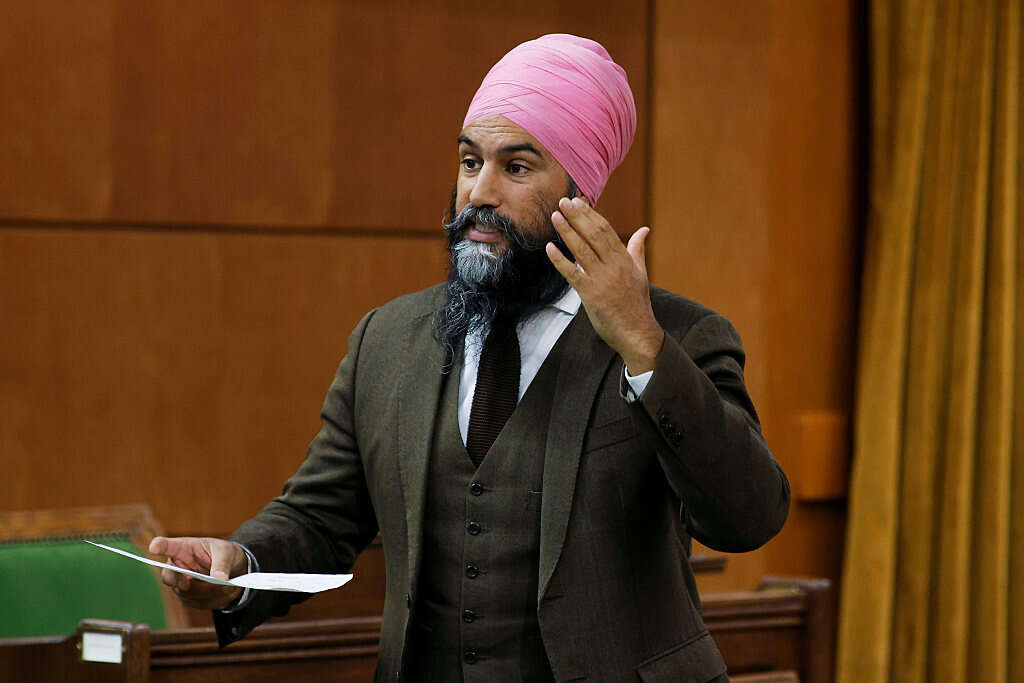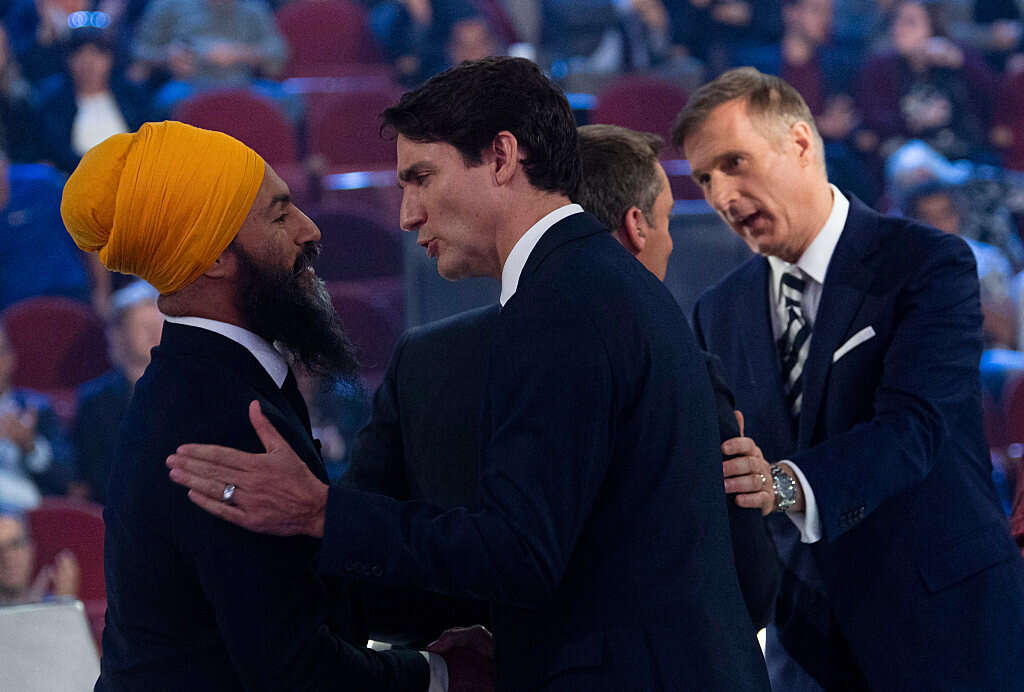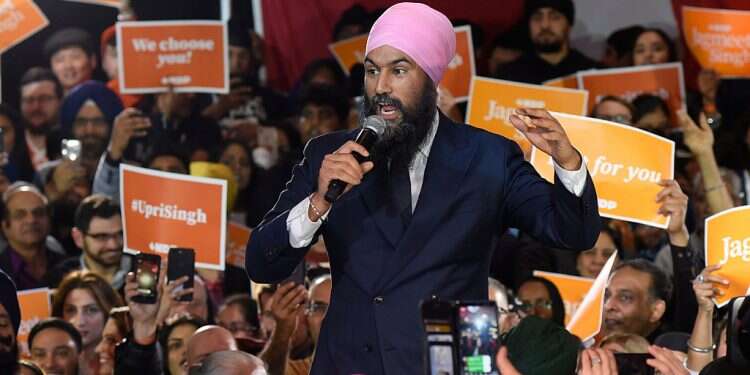At first glance, Jagmeet Singh seems like a stylish hipster, cycling to work on his designer bicycle. It is not a complete mistake: Singh is, if not a hipster himself, at least sartorially influenced by the trend, and is very popular among the hipster community. But he does not work at a vintage record store, and he rides one of his six designer bicycles to the Parliament of Canada as leader of the New Democratic Party. There, on a daily basis, he makes Canadian Prime Minister Justin Trudeau, a leader who himself knows a thing or two about fashion and visibility, seem grey, archaic and disconnected from the values of the new era.
Follow Israel Hayom on Facebook and Twitter
It has been five years since Singh, 42, became a superstar in Canadian politics. It is clear that his mere presence among politicians from the Right and the photogenic prime minister who carries the values of the Center is a game-changer for many.
As can be expected from a typical liberal politician, Singh has very clear views on the Israeli-Palestinian conflict. As a Sikh and as the first non-white leader of a Canadian political party, Singh has adopted a clear pro-Palestinian agenda. When he was his party's deputy house leader in Ontario, he was one of the only politicians who didn't agree to support the decision by the region's legislators to oppose the boycott, divestment and sanctions movement.
He explained that, from his perspective, legislating against the BDS movement is a clear infringement on freedom of expression. "Everyone has the right to criticize and to oppose [something]," he proclaimed.
He does not hide his lack of affection for Israeli policies. "In 2016 I traveled to the Middle East," he wrote on Twitter. "I witnessed the technology and development in Israel. I was shocked by the contrast I saw in Palestine." In another Tweet, he wrote, "I witnessed the presence of the Israeli military occupation in Hebron and the frustrating conditions created by settlements deep in the West Bank," and called on the UN to bring an end to the settlement enterprise.
Around two months ago, Singh called on the Canadian federal government to block arms sales to Israel, in light of Operation Guardian of the Walls, for the purpose of what he calls "creating pressure" on Israel to work in humane ways to end the conflict."
In a speech he gave in the House of Commons, he accused the Canadian government of "arming one side of the conflict," and said that "it is undermining the peace process and it is supporting [the] illegal occupation."

Early in the Israeli operation in Gaza, Singh criticized Trudeau, saying, "Will the prime minister commit to stopping the sale of arms to Israel while they are violating international human rights?" Trudeau didn't respond but said that the government is following the situation in the region "with concern," and condemned rocket attacks on Israeli cities.
It is important to note that the Canadian leader also condemned violence against Palestinian demonstrators in east Jerusalem, and expressed Canada's concern about the settlement enterprise. Where Trudeau insisted on maintaining neutrality, Singh decided to choose sides.
One of their own
According to figures published in Canada, in 2019 the state sold $13.7 million worth of military and technological equipment to Israel. Singh spoke of this during May's hostilities and claimed that it was proof that the violence in the Middle East also trickles over to Canadian politicians.
Singh, who might play a decisive role in events in our region in the not-too-distant future, started out as a criminal defense lawyer, but over time was drawn – almost involuntarily, as he likes to tell it – into a life of public service.
"I faced some significant racism as a kid growing up with a unique identity," he said in an interview with GQ magazine. "Brown skin, long hair for a boy, with a funny-sounding first name like Jagmeet, while going through childhood in a small Canadian city with little diversity. But because of having to deal with racism myself, I became very sensitive to unfairness. It created this appreciation and understanding of the struggles people go through from all walks of life."
In the same interview, Singh described his physical struggles as a child who got into skirmishes. These shaped both his political image and his sporting preferences.
"I got picked on a lot. For self-confidence and probably for some self-defense, my parents put me into martial arts and I loved it."
Singh is also a fan of MMA (mixed martial arts), something which makes him especially attractive for a young and hip community, who see him as more than just charming, "correct" and shallow. For supporters of the New Democratic Party, which he has led for four years, and definitely, for his more than one million followers on social media, he is one of their own.
As such, he is a role model for all the trendy values of the time. He begins the morning in his minimalistic flat in Burnaby, British Columbia, with a meditation session. He is married to Gurkiran Kaur Sidhu, a fashion designer who is 11 years younger, and wears suits, with the look completed by the ever-present turban.
He made headlines when he called his political adversary a "racist," was thrown out after he refused to recant, and was then suspended from the House of Commons for two days. His policy advocates removing drug possession of any kind from the list of criminal offenses in Canada and, most importantly, he likes to challenge Trudeau's polished image whenever he possibly can. For example, when pictures were published in 2019 of a young Trudeau in blackface, Singh demanded explanations. "There's the nice and smiling Trudeau who we all know," he said in an interview, "and there's a different personality who operates behind closed doors."

On social media he presents himself doing a variety of activities, in which he looks more authentic than any of his colleagues, whether he is playing soccer or dancing in a flowery shirt at the Pride Parade. A clip on TikTok from two years ago, where he is seen lip-syncing to the sounds of a song by an American rapper, has received more than four million views.
In an age where sensitivity to issues like ethnicity, immigration, and minority rights are at an all time high, and the power of social media to shape a person's image is stronger than ever, Singh isn't just the poster boy of the times, he is the spirit of the era.
Singh's popularity among immigrants, minorities and young Canadians who think he speaks their language, turns him into a reasonable candidate for Canadian Prime Minister. Like a new version of Barack Obama, if he continues his political ascent from anonymity to the state's leadership, based on his opinions on political and security issues in the Middle East, it could mean a significant change in Israeli-Canadian relations.
Subscribe to Israel Hayom's daily newsletter and never miss our top stories!




